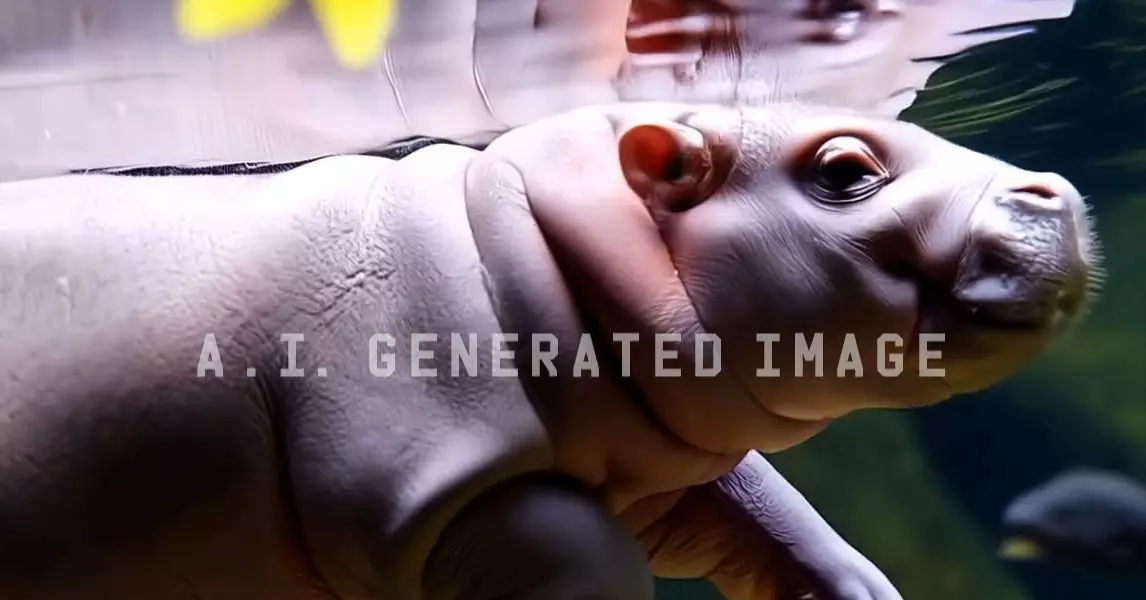Meta has recently unveiled an intriguing innovation in the realm of artificial intelligence: Movie Gen, an advanced model designed for creating and editing video and audio clips with astonishing realism. Showcasing its capabilities through several short clips, including an endearing segment featuring a baby hippo, the company’s announcement hints at a significant shift in how digital content can be created and manipulated. This new tool embodies Meta’s ongoing commitment to integrating AI into the fabric of its platforms while simultaneously pushing the boundaries of media creation.
Unlike conventional text-to-video tools, Movie Gen offers remarkable versatility. It allows users to not only generate video sequences but also to make dynamic edits to existing content. For instance, an illustrative example demonstrated a transformation where a woman in a VR headset was altered to appear like she was wearing steampunk binoculars. This feature highlights Movie Gen’s ability to intricately manipulate videos, making it suitable for creators who seek to enhance visual narratives in unique ways.
The technical specifications of Movie Gen are noteworthy, as well. The video component boasts 30 billion parameters, while the audio counterpart utilizes 13 billion parameters, showcasing considerable complexity. In comparison, Meta’s large language model, Llama 3.1, has a staggering 405 billion parameters, indicating that while Movie Gen is sophisticated, there remains even more computational power in other areas of Meta’s AI portfolio. With the capability to produce high-definition content lasting up to 16 seconds, Movie Gen claims superiority over competing models in terms of overall video quality.
Meta’s venture into AI-generated media comes on the heels of broader ambitions outlined during its recent Meta Connect event, where the company showcased an array of hardware and innovative model iterations. The introduction of Movie Gen is expected to herald a new era of digital expression, with potential applications woven into the fabric of Meta’s existing platforms like Facebook, Instagram, and WhatsApp. Such integrations could facilitate a unique user experience, allowing individuals to create and share content that is not only personal but also imbued with a touch of imaginative storytelling.
Looking ahead, the anticipation surrounding Movie Gen’s release is palpable. While the timeline for public availability remains ambiguous, it raises vital questions about how quickly Meta will adapt and capitalize on this groundbreaking technology. Post-publication, Meta provided scant details regarding the precise training data utilized for Movie Gen, stating only that it was built on a mixture of licensed and publicly accessible datasets. This ambiguity may fuel discussions around data ethics and transparency, which continue to be paramount issues in the realm of generative AI.
Meta’s foray into this space aligns with a growing trend among tech giants aiming to harness AI’s potential for creative applications. Earlier this year, OpenAI announced its own video AI model, Sora, although its public release remains unclear, mirroring the cautious approach observed with Meta’s Movie Gen. Moreover, Google’s Veo model is anticipated to make its debut within YouTube Shorts in the upcoming year, signifying a competitive landscape that is both dynamic and evolving.
Interestingly, while major tech firms cautiously introduce their models, smaller startups have begun making strides within the AI video realm, providing users with experimental opportunities. Tools from emerging companies like Runway and Pika allow adventurous users to engage with AI-driven video generation in relatable and entertaining ways, emphasizing a democratized approach to creative technology. Comparing these novel tools with the robust ambitions of larger corporations underscores a significant tension within the industry—an interplay between comprehensive corporate strategies and the emergent, often playful explorations by smaller players.
Meta’s Movie Gen represents not just a technical achievement but a potential catalyst for the way we perceive and interact with media. As the boundaries between creator and audience continue to blur, advancements like Movie Gen signal an opportunity for a more participatory media landscape. The road ahead is paved with uncertainty, especially regarding ethical considerations and market dynamics, but one thing remains clear: the future of media is being shaped by generative AI, and we are just beginning to explore its possibilities. The excitement surrounding Movie Gen should encourage us to rethink our own roles within a rapidly evolving digital ecosystem and how this technology will influence our creative expressions in the years to come.


Leave a Reply